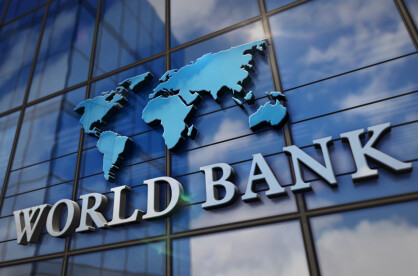Conflict vs. the global economy
Russia’s invasion of Ukraine will disrupt economies and will likely impact the, already, disadvantaged the most.

Source - Aris Messinis via Getty Images
Russia’s invasion of Ukraine will disrupt economies and will likely impact the, already, disadvantaged the most.

Source - Aris Messinis via Getty Images
The cost of war is always hefty. While certain modern-day nations may thrive on the profits of conflict, of arms sales and taking advantage of destabilised third-world nations; when first-world countries exchange fire, the scales are tipped dangerously. Repercussions are felt globally, and this can be seen in real time in the Russia-Ukraine conflict of 2022.
The Western nations, lead by the US in terms of both Cold-War-esque anti-Russian sentiment as well as economic strangleholds, have brought down the financial guillotine as punishment for Russian troop movements and aggression on Ukrainian soil. The edge of the metaphorical guillotine cut through Russian financial institutions, key being the sanction upon using SWIFT for inter-bank transactions.
The “Society for Worldwide Interbank Financial Telecommunication”, SWIFT, is a secure messaging system that facilitates rapid cross-border payments, which allows intentional trade to flow smoothly and instantaneously. Through SWIFT messages, banks can establish relationships across borders, and the level of security allows such payment instructions to be honoured without question, increasing the volume of transactions as high as need be. It has become the principal mechanism for financing international trade, concluding roughly 38 million SWIFT ‘FIN messages’ each day during 2020.
With Russia being entirely restricted from using SWIFT, the financial shock is being felt across the board. First of all, Russian companies and individuals will find it harder to pay for imports and services, as well as receive cash for exports, as well as to borrow or invest overseas. Russian oligarchs invest in multiple countries worldwide and this move is intended to hurt them and effectively cripple the Russian economy by isolating the nation from the global financial system, step by step. As of now, Russian banks can use other channels for payments such as phones, phone applications, as well as email, but only with nations that haven’t imposed sanctions on them yet.
On the other end of the stick are the nations that would be detrimentally affected by dependancy on Russian trade. This includes wheat and grain, crude oil and natural gas, and also tech and industrial raw materials such as palladium, nickel, and aluminium. Furthermore, oil prices per barrel are hitting higher values, pushing up consumer bills all across the map in Europe as well as the US. Some of the nations that have already begun pulling the plug on certain Russian investments and financial interdependency include Ghana, Turkey, Egypt and Pakistan, showing how some financially vulnerable countries are taking no risks in waiting for the outcome of the conflict.
Russia is a key supplier of industrial materials to the developed world, while Russia and Ukraine together are major wheat exporters. Economists around the world warn of exacerbated supply chain disruptions, already reeling from the effects of the pandemic. It makes up 70 percent of Egypt and Turkey’s wheat import, and the move will put further strain on these countries still struggling with inflation, 50 percent in Turkey, putting them deeper into economic crisis. It raises food, fuel and electricity prices exponentially.
“Poorer people spend a higher share of incomes on food and heating,” said Ian Goldin, a professor of globalisation and development at Oxford University. Ukraine, a nation long known as the “breadbasket of Europe,” sends more than 40 percent of its wheat and corn exports to the Middle East or Africa. The disruption to this export raises concerns of further food shortages and price increases, which could incite social unrest. Lebanon, a nation experiencing one of the most devastating economic crises in more than a century, gets more than half of its wheat from Ukraine, which is also the world’s largest exporter of seed oils like sunflower and rapeseed.
Being one of the largest producers of oil, Russia is being depended upon by most of Europe for their energy needs. Germany clamping the Nord Stream 2 pipeline shut does not create issues immediately as the pipeline was not in operation to create a dependancy on it, but the 40 percent of European natural gas supply and 25 percent of their oil supply now lies threatened. Steep increases in prices have already been recorded, from even before the Russian boots were on the ground, and with cold weather ahead, consumers are expected to feel the brunt of this. Natural gas researches are at less than a third of capacity, and European leaders have already begun accusing Russia of holding back supplies to gain a political edge.
The Wall Street Journal has already reported that the US and other major oil-consuming nations have considered releasing 70 million barrels of oil from emergency stockpiles. This comes hand in hand with the pressure applied on OPEC nations to ramp up their supplies, an increase of 400,000 barrels per day. The price of Brent Crude oil has been raised by Goldman Sachs to USD100 per barrel since 24 February and then to USD110, as well as a rise of 30 percent in European gas prices.
This conflict unearths quite the power play that has been hidden from the public in terms of arms sales, cross-border financial dependancy, and the vulnerability of the global economy. The US has already experienced sharp increases in utility prices and it is expected to get worse, with the worst of the shock felt by the public consumers.
Wider consequences are dependant on the stance taken by Beijing in response. Their situation is roughly similar, with the issue of Taiwan’s insistence of independence, and any moves made by the Chinese government would further the rift already being created between US backed nations and their perceived competition.
The global economic blow-out is being compared to the post-Soviet era of 1991, with the frailty of supply chains and the speed at which sanctions are being levied. While global markets are not exactly reacting with the same fervour of a global conflict, economists tend to sit on the fence on the long term effects — while there was a sell-off in equities, bond yields declined and credit spreads have not widened much.
What can be expected now is a sharper, starker divide in global economies, with the promissory between Russia and China for interdependence, and isolation of the main economies. Maldives might well be forced to choose sides if the rift solidifies, and the country will experience at least some economic pressure on this issue — the how much and how long will depend on if, and how, the conflict continues to unfold.



